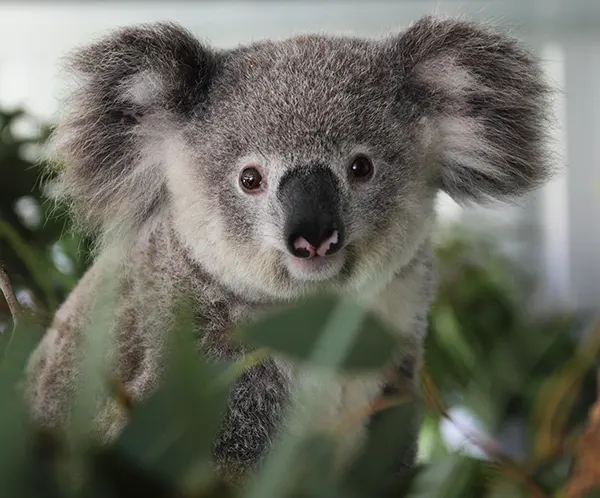
Koalas are solitary animals found in cool temperate to tropical regions. They were once found throughout the eucalypt forests of Australia. They are protected as are all native Australian animals and they are now listed as a species vulnerable to extinction in NSW and Queensland.
View or download our factsheet explaining how we work for koalas.
Appearance
Koalas have thick fur for protection, large round furred ears, a large dark soft leathery nose and beady eyes. They have an acute sense of smell and hearing.
Behaviour
Koalas usually eat for about 20% of the day and sleep for the other 80%. They sleep in the forks of trees and feed mainly at night being most active at pre-dawn and dusk. A Koala’s diet includes a selection of leaves, flowers, fruit and bark of the Forest and Red gum in the north, the Manna, Grey and Swamp gum in the south. Preference may vary with the time of year or locality. Each animal eats about 1/2 a kilogram of leaves a day and obtains sufficient water from its food. They often make grunting sounds, bellows and can also make a continuous wailing sound. They are expert climbers, jumpers and when on the ground they can bound at a very fast pace.
Breeding
Koalas breed in summer and the young are born about a month after mating. A new born koala is the size of a bee and spends its first 13 weeks its mothers pouch which opens downwards and to the rear. Joeys leave the pouch at 7 months and then travel on their mother’s back, joeys will still return to the pouch to suckle. Joeys are fully weaned and independent by 12 months. Females become sexually mature at 2 years, males at 3-4 years.
Rescuing Koalas
If you find a sick, injured or orphaned koala please call WIRES Rescue Line 1300 094 737 or fill in the Rescue Form.
To access 24/7 rescue advice and assistance for sick, injured and orphaned native animals call 1300 094 737, or fill in the online rescue form.
Sign Up for Wildlife News
Stay in touch and get our regular rescue stories, WIRES updates and a free copy of our 15 Ways to Help Wildlife ebook
